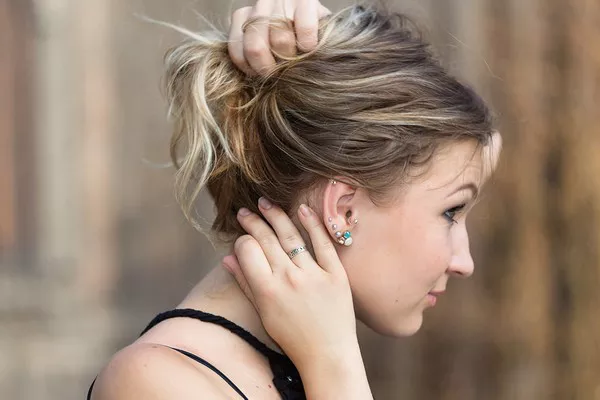Itchy scalp, a common complaint among adults and adolescents, can be an embarrassment and a source of discomfort. While occasional itching is normal and not a cause for concern, persistent scratching may indicate underlying issues, often related to allergies. This article delves into the various allergies that can cause an itchy scalp, their causes, symptoms, and potential treatments.
Understanding the Causes of Itchy Scalp
An itchy scalp can have numerous causes, ranging from simple dryness to complex skin diseases. Some of the most common allergies and conditions that lead to scalp itching include:
Seborrheic Dermatitis
Seborrheic dermatitis is a common skin condition caused by a yeast-like fungus called Malassezia furfur. This fungus thrives on the scalp and can cause inflammation, redness, and scaling. The condition is more prevalent in individuals with oily skin and those who have a higher number of sweat glands. Additionally, a lack of vitamin B, fatty acids, or zinc may contribute to the development of seborrheic dermatitis.
Symptoms include itchy, red, and greasy scalp with flaky white or yellow scales. This condition can also affect other areas of the body, such as the face, chest, and back. Treatment typically involves using antifungal shampoos containing ingredients like ketoconazole, selenium sulfide, or zinc pyrithione.
Contact Dermatitis
Contact dermatitis is an allergic reaction to substances that come in contact with the skin. In the case of the scalp, this can include shampoo, conditioner, hair dyes, styling products, and even the material of hairbrushes. Common allergens include parabens, fragrances, formaldehyde, and preservatives.
Symptoms include redness, swelling, itching, and burning sensations on the scalp. In severe cases, blisters or crusting may also appear. Identifying and avoiding the offending substance is crucial. Topical corticosteroids or antihistamines may be prescribed to relieve symptoms.
Head Lice (Pediculosis Capitis)
While head lice are not technically an allergy, the reaction to their bites can cause intense itching. Head lice are tiny insects that live on the scalp and feed on blood. They lay eggs (nits) close to the scalp, which can be difficult to remove.
Symptoms include intense itching, especially behind the ears and at the nape of the neck. Red bumps or sores may also appear due to scratching. Treatment involves using medicated shampoos or lotions to kill the lice and their eggs. Nit-combing is also essential to remove any remaining eggs.
Allergies to Hair Care Products
Certain hair care products, especially those containing harsh chemicals or fragrances, can trigger allergic reactions on the scalp. This includes shampoos, conditioners, hairsprays, gels, and mousses.
Symptoms include redness, itching, burning, and scaling. In some cases, a rash may also develop. Switching to hypoallergenic or natural hair care products can help alleviate symptoms. Patch testing may be necessary to identify specific allergens.
Food Allergies
While less common, food allergies can also cause itchy scalp, especially in individuals with atopic dermatitis (eczema). Foods such as dairy, eggs, nuts, and soybeans are common allergens.
Symptoms may include itching, redness, and swelling not only on the scalp but also on other parts of the body. Digestive issues like diarrhea, vomiting, or abdominal pain may also accompany food allergies. Identifying and avoiding trigger foods is crucial. In severe cases, immunotherapy or allergy shots may be considered.
Diagnosing and Managing Itchy Scalp Due to Allergies
Diagnosing the underlying cause of an itchy scalp involves a thorough medical history and physical examination. Your healthcare provider may ask about your symptoms, hair care routines, and any recent changes in products or lifestyle. They may also perform a scalp biopsy or skin scrape to look for signs of infection or parasites.
Treatment Options
Treatment for itchy scalp due to allergies typically involves a combination of approaches:
Avoidance of Triggers: Identifying and avoiding the offending substance or allergen is the first step in managing itchy scalp. This may involve switching hair care products, avoiding certain foods, or treating underlying conditions like seborrheic dermatitis.
Medicated Shampoos and Lotions: Antifungal, anti-inflammatory, or corticosteroid-based shampoos and lotions can help relieve symptoms. These products work by reducing inflammation, killing fungi or bacteria, and soothing the skin.
Oral Medications: In severe cases, oral antihistamines or corticosteroids may be prescribed to reduce inflammation and itching. These medications work systemically to provide relief from symptoms.
Lifestyle and Home Remedies: Maintaining a healthy diet, staying hydrated, and using gentle, hypoallergenic hair care products can help prevent itchy scalp. Home remedies like apple cider vinegar rinses, tea tree oil, or aloe vera gel can also provide relief.
Stress Management: Stress can exacerbate itchy scalp symptoms. Techniques like meditation, yoga, or deep-breathing exercises can help manage stress and improve overall skin health.
Conclusion
An itchy scalp can be a frustrating and embarrassing problem, but understanding the underlying causes can help you find effective treatment. Allergies to hair care products, food, and even environmental factors can all contribute to scalp itching. By working with your healthcare provider, identifying triggers, and using appropriate treatments, you can manage your symptoms and enjoy a healthier, happier scalp.
Related Topics:

